Welcome to the week.
Here are the most noteworthy items we came across in the past seven days…
It’s not your fault: The idea that we all have a “carbon footprint” is nothing more than “devious” propaganda pushed by Big Oil to shame and distract us for their environmental destruction says this Mashable article.
Primed for e-bikes: Recent staffing moves hint that Amazon might be looking to bulk up its use of electric bikes for last-mile deliveries.
Commons sense: Boston joins Paris as one of the latest city to make protected bike lanes created for the pandemic, permanent.
Race in the race: Frenchmen Kévin Reza, the only Black man to compete in the year’s Tour de France, tells CyclingNews that he doesn’t feel solidarity in the professional peloton — even after two incidents of racial abuse from other riders.
Not driving, still charged: The person who was behind the wheel of a “self-driving” Uber car that hit and killed a woman crossing the street on foot in 2018 has been charged with negligent homicide. The driver was reportedly watching TV on her phone when the collision occurred.
Advertisement
Indoor domination: In the latest sign of popularity for indoor riding, software platform Zwift inked a $450 million investment deal and is likely to use the money to develop a bike and other hardware.
Cycling saves lives: A Massachusetts man who credits bike rides for changing his outlook on life is on a nationwide bike tour to raise awareness of suicide.
Intentions matter: In a car or on a bicycle, nearly all road users break some laws sometimes, but recent research says there are important differences why.
Tour de Tadej: 22-year old Slovenian Tadej Pogacar snagged a dramatic Tour de France victory on the penultimate stage and this reflection on CyclingTips does a great job capturing why it was so magical and unexpected.
The recovery rush: The UK’s bike boom has been met with a commensurate bike theft boom and there’s a growing cadre of vigilantes who revel in the thrill of returning the bikes to their owners.
— Jonathan Maus: (503) 706-8804, @jonathan_maus on Twitter and jonathan@bikeportland.org
— Get our headlines delivered to your inbox.
— Support this independent community media outlet with a one-time contribution or monthly subscription.



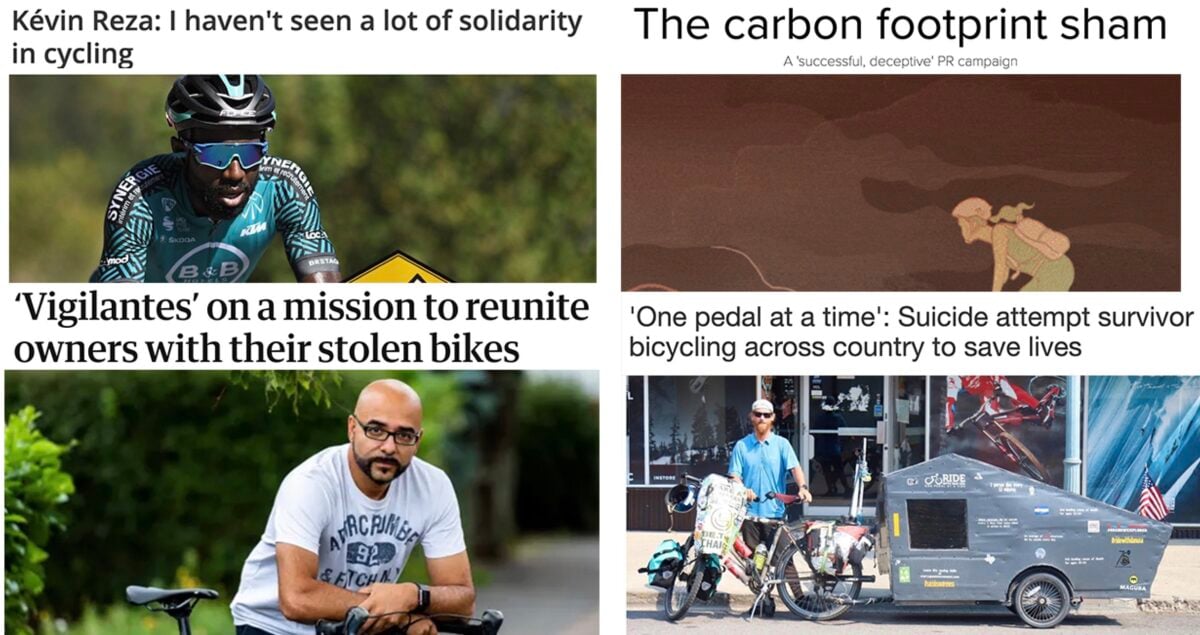


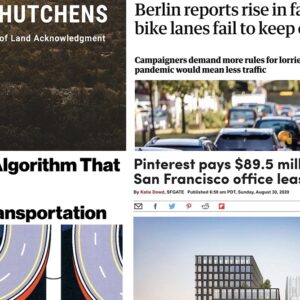

Thanks for reading.
BikePortland has served this community with independent community journalism since 2005. We rely on subscriptions from readers like you to survive. Your financial support is vital in keeping this valuable resource alive and well.
Please subscribe today to strengthen and expand our work.
This article on carbon footprints is infuriating. Just because we live in a world where finding a sustainable choice is difficult or sometimes impossible doesn’t mean you should just throw up your hands and say “nothing I do matters, why even try?”. What a ridiculous mindset to have. Yes, corporations contribute far more pollution than individuals do, but that doesn’t eliminate pollution by individuals. Corporations will never change their behavior without public pressure, the same way the government isn’t going to intervene without, again, public pressure. Live as low-plastic as you can, get rid of your car or stop driving for each and every little thing, stop eating meat or cut down your consumption. Don’t just be complicit in the destruction of our planet. There is no magical solution for climate change, but that doesn’t mean that everyone making individual changes won’t have a cumulative effect.
That wasn’t the message I took away from that article. For example, it quoted Benjamin Franta in a positive way as saying:
I think that’s similar to your position of “…doesn’t mean you should just throw up your hands…” I think the article generally supports doing things like recycling and consumer-level energy saving.
The problem it points out is the manipulation of consumers via very calculated marketing (“manipulative playbook “) which casts them as the problem, and the corporation as the salvation, with the effect being the consumer is lured away from larger, system-level changes which have greater effects on both greenhouse gasses and corporate power.
The things the article misses for me are suggesting that electrification of our transportation will solve the problem (reducing the quantity of transportation is the solution) and not addressing the root cause: over population. To be fair, those are outside the article’s scope of “a successful, deceptive PR campaign.”
Alan, while I agree with your points about our transportation system, I still take issue with this article in the way that it frames consumers/individuals as helpless victims, especially with the headline “The carbon footprint sham” that many people won’t even read past. Big oil greenwashing campaigns are nothing new, and it just seems reductionist to me to focus on big oil redirecting blame onto consumers without also acknowledging that consumers could do so much more to be part of the solution.
I think the point of the article is that the campaign was intended not only to shift more responsibility onto consumers/individuals, but in so doing precisely to make many of them feel helpless.
LOL at USAnians feeling hopeless about the climate crisis.
We caused this crisis, to a large degree, and will suffer far, far fewer consequences in coming decades than the nations we exploited. I realize that progressives love to flaggelate themselves with their scientifically-illiterate fantasies of Malthusian extinction but this is, mostly, a defense mechanism that allows people to avoid the individual and collective change needed to address ecological genocide.
I was self-flagellating before it was cool.
That’s fair enough. I try to avoid getting suckered in to commercial propaganda in general (and I think quite a few others here are similar in that regard, you included, Al). I hadn’t been aware of that root of the “carbon footprint” term, and I’m glad I now know. It is one more piece of immunity against the misinformation pumped at me (at everyone) by not only oil companies but all megacorporations (corporate fascism).
Jacob H. Fries, editor of the Inlander, writing about journalism, social media, and the state of information distribution rather than about oil and climate change, but I think in a similar vein, wrote this the other day:
— https://www.inlander.com/spokane/the-poisonous-scourge-of-bogus-information-grows-in-2020/Content?oid=20319039
As the IPCC 1.5 degree report made very clear, a large part of the CO2e emissions of wealthy anglo-european nations are exported to less wealthy nations (resource-extractive capitalism). If the USA and other wealthy nations does not address consumption-based emissions, hopes of addressing the climate crisis are fantasy.
https://www.ipcc.ch/site/assets/uploads/sites/2/2019/06/SR15_Full_Report_High_Res.pdf
Even the Portland/Multco 2017 climate action progress report acknowledged that the majority of Portland’s emissions are due its imports, not local emissions (consumption-based CO2e accounting).
https://multco.us/sustainability/climate-action-plan-progress-report-2017
Essentially the carbon footprint essay illustrates how USAnians are very good at blaming others in order to avoid making even the most modest changes to their lifestyles and socioeconomic system.
Those big oil companies (many of which are state-run companies outside of the USA) forced me to buy a 12-20 ton SUV-Truck!!!1!
Those big industrial manufacturers (many of which are state run companies outside of the USA) forced me to buy absurd amounts of disposable crap from Amazon!!!!1!
Real Estate developers forced me to buy a 2500-4000 square foot “small” house!!!!1!
And so on…
It’s possible to be concerned about the environment and simultaneously think concepts like per capita and carbon footprint have a limited and often manipulated place in the discussion. I lost interest in carbon footprint calculators when i realized that by flying first class I was a somehow bigger offender than others on the flight. As a limited inhabitable resource, the earth likely doesn’t care about per capita pollution so much as the absolute amount of carbon/ghg we are releasing.
believing such things no doubt makes me an enemy of some righteous souls…but it shouldn’t. I get that the US uses more electricity to run air conditioning than the entire continent of Africa uses in electricity…thats astounding and wasteful…but the continent of Africa doesn’t want us to use less energy so much as they want access to MORE…We can and should do whatever we can to minimize our own impact, but lets stop pretending that we save the world by banning plastic straws — its a great gesture but the economist in me realizes its a largely useless gesture.
If you can’t make the tiniest concession in your own life then it’s a near certaintly that you will not push for the changes needed to begin to address the climate crisis. So when you say that “you lost interest”, I think you never had any interest. In fact, I believe USAnians will continue to crap in the global commons because the this culture is far too narcissistic to care much about the lives of future generations in Africa or the USA. My main hope is that the USA continues to become a global pariah and that sanctions and/or socioeconomic collapse force change.
Conflating oceanic conversation* with the climate crisis is hilarious in a Dunning-Kreuger kind of way. As I said above ‘murricans always want to blame someone else (e.g Africans living in poverty) for their own idiotic self-absorption and self-harm.
*Plastic straws represent a negligible amount of oceanic plastic pollution — the vast majority comes from industrial fishing.
https://www.greenpeace.de/sites/www.greenpeace.de/files/publications/20190611-greenpeace-report-ghost-fishing-ghost-gear-deutsch.pdf
“If you can’t make the tiniest concession I think most people are willing and capable to make tremendous concessions to effect real change, but not for performative acts…and the calculation of carbon footprint hinging on prices paid smells like a performative act. i think that is where lomborg gets things right: we need to take ownership of our agency and make actual decisions about what paths to travel, as opposed to chasing every socially-pushed feel good march. u can check my math but if the “500mm straws used per day” argument was actually true (and people certainly pretended that it was), then switching over to paper straws at a cost of $.08 more per straw implies as much as $40,000,000 A DAY spent on switching to paper straws…its an absurd example based on an absurd (yet commonly pushed) stat, but there’s not a person on this blog who couldn’t think of a better use of $40mm/day to impact climate change than “lets switch from plastic to paper straws!!”
“I think most people are willing and capable to make tremendous concessions to effect real change…”
This made me spit out my coffee in laughter. As far as I can tell, few people in Portland (or other USAnian cities) are interested in even understanding the concessions they could make. This is why Portland and other cities get away with bogus production-based emissions metrics. Sure … we should ignore oil company propaganda but the idea that we should pay little attention to our aggregate individual contributions (e.g. our carbon footprint) is rooted in denial.
“85% of the emissions associated with goods and services consumed in C40 cities are generated outside the city.”
“Individual consumers cannot change the way the global economy operates on their own, but many of the interventions proposed
in this report rely on individual action. It is ultimately up to individuals to decide what type of food to eat and how to manage their shopping to avoid household food waste. It
is also largely up to individuals to decide how many new items of clothing to buy, whether they should own and drive a private
car, and how many personal flights to take. As this report shows, these are some of the most impactful consumption interventions that can be taken to reduce consumption-based emissions in C40 cities.”
https://c40-production-images.s3.amazonaws.com/other_uploads/images/2270_C40_CBE_MainReport_250719.original.pdf?1564075036
what do you think is a reasonable estimation of drop in GHG emissions by the forced shut down from quarantine across the “developed world” (i hate this categorization) ? I’ve seen estimates from 5%-15% altho the 15% I think was a bit optimistic in its calculations (ignoring emissions that are effectively exported while consumption remains). To me this is a good benchmark of what we can accomplish in our wildest of dreams through individual self-sacrifice with near 100% participation..
“To me this is a good benchmark of what we can accomplish in our wildest of dreams through individual self-sacrifice.”
I think your “benchmark of what we can accomplish in our wildest of dreams” is enormously exaggerated.
For example, gasoline bounced back to ~95% of the 5 year average (note the y axis):
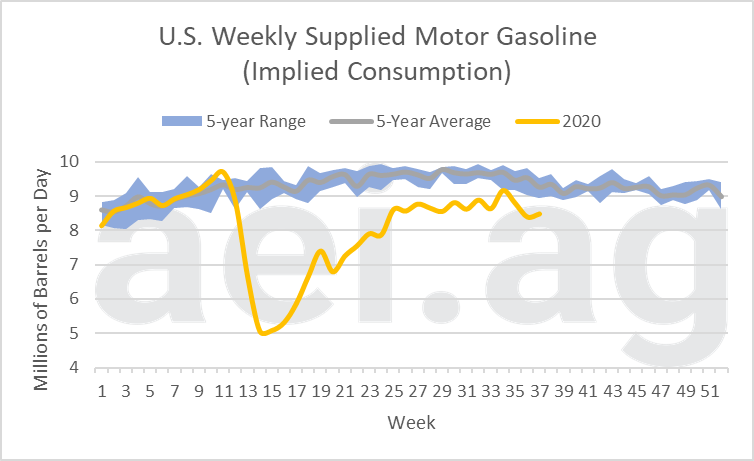
Aggregate consumption (PCE) rapidly recovered to ~95% of February numbers (note the y axis):
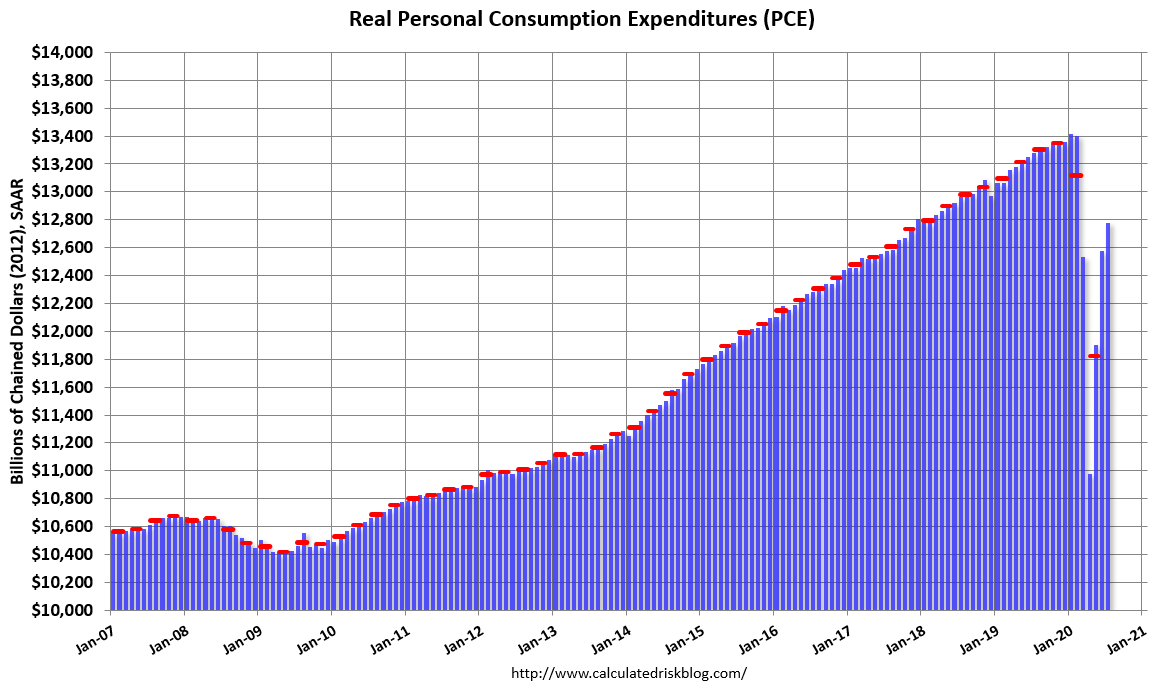
These brief dips will likely result in relatively small decreases when annualized.
My best guess based on my non-expert read of the literature, is that our yearly decrease in consumption-based CO2e emissions in the USA will be a touch above the projected 3-4% decrease in GDP (say ~5-7%). This assumes that we don’t see another lock down (which is certainly possible).
https://www.federalreserve.gov/monetarypolicy/fomcprojtabl20200916.htm
not sure why my links showed up as images.
if jonathan maus edits them away, the actual links are here:
https://aei.ag/2020/09/21/the-most-interesting-chart-in-2020-u-s-gasoline-consumption/
https://www.calculatedriskblog.com/2020/08/personal-income-increased-04-in-july.html
i don’t think PCE is the best proxy for consumer led emissions altho i appreciate the tact you are attempting…PCE i think is going to be influenced by market prices so the massive oil rebound (or DXY destruction) in april/may will paint much more of a V shaped recovery than any of us noticed. FRED has a 12mo moving avg of total vehicle miles driven in US that is current thru June and shows a massive cratering that I think intuitively makes more sense to what we’ve experienced
https://fred.stlouisfed.org/series/M12MTVUSM227NFWA
The FRED graph shows a 12 month moving average so not at all comparable. FHWA year to date VMTs are only off 15% but VMT will almost certainly go up (absent another shutdown).
https://www.fhwa.dot.gov/policyinformation/travel_monitoring/20jultvt/page2.cfm
Retail sales with and without gasoline:
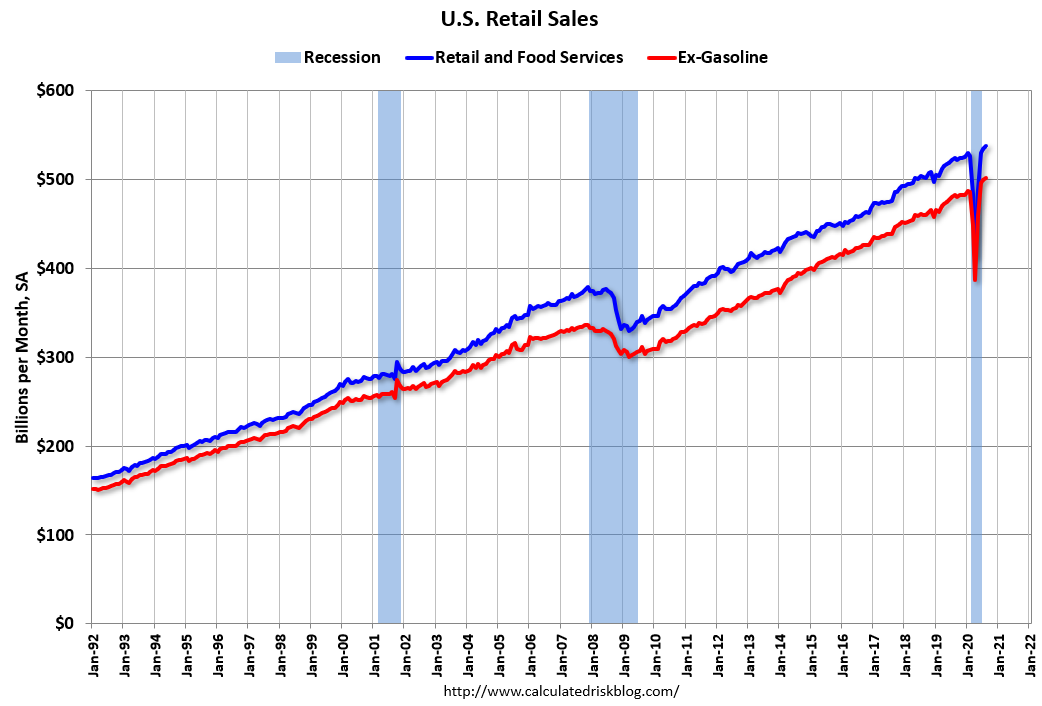
LA area port containers (as a more current proxy for consumption):

I realize this isn’t about the straws, but it does illustrate part of the problem. A lot of our conversations are about substituting one item for another, not changing our underlying norms and behavior.
For me… no straw, please.
I know it is wrong of me, but the thought of Bike Theft Vigilantes makes me smile.
I agree. It sounds a bit like a title for a Monty Python skit, especially the part about pushing off other riders.
We will need bike theft vigilantes in Portland, now that the PPB has disbanded the Bike Theft Task Force. (Surprised that move hasn’t generated an article here.)
Correction, Tadej Pogacar was 21 when he won in Paris on Sunday. Today (Monday) is his 22nd birthday. At 21 he is the youngest TdF winner since 1904, or so said Bob and Phil during their announcing of the race. I thought they both did an excellent job btw.
On the issue of a self-driving car killing a person in Arizona, after a couple years it’s interesting to finally hear more about what happened.
– The human who was supposed to be monitoring things was watching a video on their phone.
– Uber had actually disabled the AEB system (something that is standard equipment on this Volvo, added self-driving capabilities notwithstanding).
Ironic that a vehicle inside which no one has ever been killed (or at least, as recently as 2018 Volvo was making exactly that claim about the XC90) was modified to make it more likely to kill others.
I understand they might have been motivated to do that in order to verify the behavior of the systems they had added, and separate their effects from those of the Volvo’s built-in autonomous systems, but that should have been avoided by designing their systems to be more cautious than Volvos’. Anything they tested should have been additive, not subtractive.
On personal responsibility: Every dollar spent on gasoline is a telegram to Some Oil Company. The text? “Drill Baby Drill”.